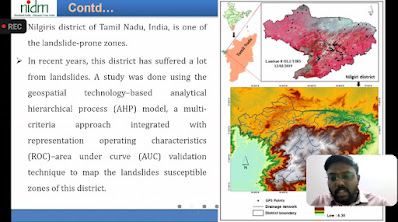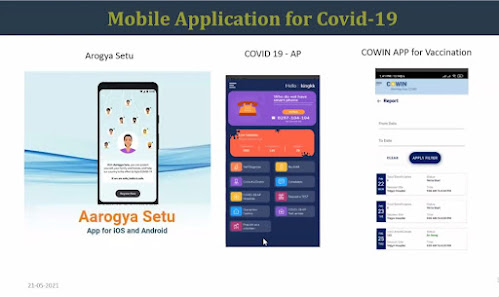TRAINING REPORT
Three
Days Online Training Program
on
Incident response system: Basic and Intermediate
Jointly Organized by
National
Institute of Disaster Management (NIDM)
(Ministry of Home Affairs, Govt. of India)
NDCC Building-II, 4th Floor,
Jai Singh Road, New Delhi – 110 001
www.nidm.gov.in
and
Unnat
Bharat Abhiyan (UBA)
SRM Institute of Science and Technology
Kattankulathur, Chengalpattu, Tamil Nadu
www.srmist.edu.in
|
TRAINING SNAPSHOT |
|
|
Welcome
Address |
Dr. Deepa, T,
Associate professor, Department of Electronics and Communications
Engineering, SRMIST |
|
About
the programme |
Shri Shekher
Chaturvedi, Assistant Professor, NIDM |
|
Special
Address |
Dr. Thirumurugan,
Associate Director (CL) and Nodal Officer (UBA) |
|
Keynote
Address |
Major General. Manoj Kumar
Bindal, Executive Director, NIDM |
|
Resource
persons |
Dr. K.S. Vignesh, Assistant
Professor, SPH, SRMIST
Shri Shekher Chaturvedi, Assistant Professor, NIDM Shri Balaji, USFS Dr. Yuvaraj, Lead Consultant DRR Taru Leading Edge, New Delhi |
|
Coordinators |
Dr. K.S. Vignesh, Assistant
Professor, SPH, SRMIST |
|
Moderator |
Shri Arun Verma,
Young Professional, NIDM |
Participant
Details
|
TRAINING DATES |
NUMBER OF PARTICIPANTS |
|
19th May, 2021 |
400 and above Participants (List Attached) |
|
20th May, 2021 |
|
|
21th May, 2021 |
INTRODUCTION
The
Incident Response System (IRS) is an effective mechanism for reducing ad-hoc
measures in response. It envisages a composite team with various sections to
attend to all the possible response requirements. The IRS designates officers
to perform various duties and get them trained in their respective roles. It
also emphasizes the need for proper documentation of various activities for
better planning, accountability and analysis. This will greatly help in
reducing chaos and confusion during the response phase. Everyone will know what
needs to be done, who will do it and who is in command.
IRS-PRINCIPLES AND FEATURES
· Information and intelligence Management
· Management by Objectives (MBO)
· Function Based Organization
· Comprehensive Resources Management/ Manageable span of control
· Delegation of Authority and Chain of Command
· Unity of Command
· Transfer of Command
· Unified Command/ Area Command
· Incident Facilities
· Integrated Communication
· Accountability
· Incident Action Plan- op period, objective, tactical plan, support plans
PLANNING ON IRS SYSTEM
· The planner of an event should take into account of some factors like Type of event, location size, expected duration, history and potential in order to project incident objective, Number of organizations involved, jurisdictions etc.,
- Benefits of a process are to enhance safety, Reflects the direction of the responsible officer (RO), clarifies role, builds stronger teams etc.,
· Tactics is to specify what must be accomplished within the selected strategy or strategies in order to achieve the incident objective.
· Objective is to state what will be accomplished (What you want it to look like)
THE PLANNING MEETING
OPERATIONALISATION OF IRS
EMERGENCY OPERATION CENTRE(EOC) SUPPORT TO INCIDENT
RESPONSE
EOC support allows incident managers to focus on the needs of incident
EOC support incident
response by:
TSUNAMI
· INCOIS detected an earthquake of magnitude>9M in Sumatra, assessed threat for India and issued a Tsunami watch bulletin
- Alerts from INCOIS.
- Automated Web-GIS System alerts officers of IRS, District Collectors, first responders and users.
- Emergency alerts will sound even if mobile is in silent mode and stops only if the user views that alert
- Response based on Standard Operating Procedure until NO THREAT is issued from INCOIS
CYCLONE
EXISTING DSS FOR PANDEMIC
TRAINING OBJECTIVES
·
To understand about disaster
management cycle and vulnerability of Tamil nadu
TRAINING DETAILS
The training programme on Incident response system: Barrier and intermediate was jointly conducted by the NIDM and UBA SRMIST from 19th May 2021 to 21st May 2021. The training programme was held Zoom platform using briefings, presentation, panel discussion, case studies along with question and answer, sessions. The E-Training was guided by Major General Manoj K Bindal, Executive director, National Institute of Disaster Management and Dr. V. Thirmurugan Associate director (CL) and Nodal officer (UBA)
On the first day of training, the programme commenced with a welcome address by Dr. Deepa T Associate Professor, Department of ECE at SRM. The special address was delivered by Dr.V. Thirumurugan Associate Director (CL) and Nodal Officer (UBA) followed by the keynote address Maj.Gen. Manoj Kumar Bindal Executive director, NIDM. The first session was rendered by Dr. K.S Vignesh, Assistant Professor, SPH, SRMIST. Disaster management cycle and vulnerability of Tamil Nadu.The session ended with discussion of case studies. The next session was delivered by Shri Shekar Chaturvedi Assistant Professor., NIDM. IRS: Principles and Features. The session ended with a question-and-answer session with the panelist.
 |

On day two of the training, Shri Balaji, USFS.Planning on IRS System. The next session was delivered by Shri Shekher Chaturvedi Assistant professor. NIDM.IRS: Operationalization. Followed by Q and A session. The session ended with discussion. On the third day of training Shri Balaji, USFS. Emergency operations center: Role as decision support system. The next session was delivered by Dr. Yuvraj, Lead Consultant DRR Taru Leading Edge, New Delhi.WebGIS Based Decision Support System in disaster management. Followed by Q and A session. Valedictory address delivered by Dr. K S Vignesh. The 3 days training Programme concluded with a Vote of Thanks by Shri Arun Verma, YP.
KEY TAKE AWAY
·
Prepare with triage exercise
TRAINING GLIMPSE
Share to All













0 comments:
Post a Comment